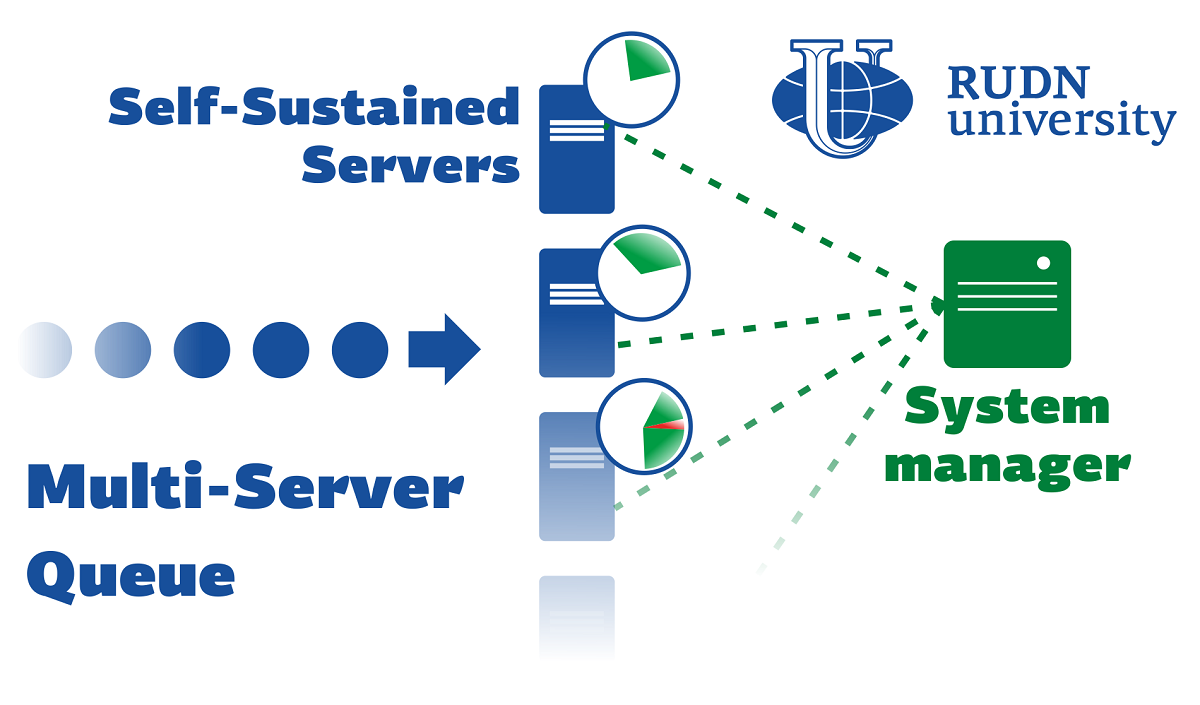RUDN University Mathematicians Create a Model for Queue Organizing with Self-Sustained Servers
Queuing theory is used in communication networks, business processes, transport networks and other areas. These different processes as they may seem can be described by the same mathematical models. Their core is the distribution of customers (for example, computing tasks, customers in a store, passengers, etc.) between servers (for example, processors, cash registers, drivers, etc.) in the most optimal way. Many applications give rise to many varieties of mathematical models of such systems. Most of them assume the presence of a “manager”, a centre that distributes customers to servers, determines when the server should start and stop working. RUDN University mathematicians have proposed a new model in which servers themselves make decisions about the start or end of work.
“The process of servers’ occupation is usually completely defined by the arrival of customers. The arrival of a new customer implies the occupation of one more server if some server is free. The extreme diversity of real-world systems and processes that can be modeled by multi-server queuing systems gave raise to consideration of other scenarios of involvement of the servers into the processing of customers.The most common assumption is that provide service to arriving customers under the control of the system manager.The distinguishing feature of the considered model is the self-sufficiency of the servers”, said Alexander Dudin, PhD, Director of Research Center at the Institute of Applied Mathematics and Telecommunication of RUDN University.
The model proposed by RUDN University mathematicians combines the features of a system with a controllable number of active servers and systems with vacations. In the first case, the required number of system servers is activated if the number of clients exceeds a fixed value. In the second system, the server can temporarily stop operating (go on vacation, for examplebstop production if there are no new orders). The decision is made not by the server itself, but by the manager. In the new model, the servers are self-sustained. Any server that has finished servicing a customer decides whether to serve a new customer or go on vacation, regardless of the situation in the system and the manager’s decision. The manager can send the server an invitation to come back to work if there is a lot of customers in a queue. The server can either accept or reject it. The leverage of influence of the manager is not to let the server return from vacation if the queue of customers is too small.
RUDN University mathematicians investigated the model using matrix analysis and derived formulas for calculating the performance parameters of the system (the number of clients in the “waiting room”, the number of busy and free servers, the probability of losing a client due to a long wait, etc). Then they demonstrated the operation of the model on a numerical example. They set the input data and calculated the optimal parameters of the system. An example of the result looks like this: “to maximize the benefits, the system needs 65 servers. The server is allowed to return to work if there are at least 3 customers in the queue. Servers are invited to return to work if there are more than 11 clients in the queue.”
“Such a type of model can have potential applications for the investigation of real systems with low centralization of operation of the system and the possibility of flexible choice of a working schedule by the servers, e.g., some modern systems with workers that are the freelancers that work at their free time when they wish, e.g., transportation systems, in particular, taxi drivers”, said Konstantin Samouylov, PhD in Technical Sciences, and the head of the Department of Applied Informatics and Probability Theory at RUDN University.
The results are published in Mathematics.
Sergey Ivanov, a scholar from St. Petersburg, has been named the first winner of RUDN University’s International Prize for Scientific Achievements in Mathematics, worth 5 million rubles.
Products derived from microalgae represent a cutting-edge development in the field of bioeconomy. The potential of this biological resource was discussed at the international research seminar “Foundations for a Green Sustainable Energy”, part of the BRICS Network University’s thematic group on “Energy”. The event was organized by the Institute of Ecology at RUDN University.
Ambassadors of Russian education and science met at a conference in RUDN University to discuss how they can increase the visibility of Russian universities and research organizations in the world, and attract more international students in Russia.
